France, a democracy in crisis
The backlash to the French government’s pension reform has brought the country to a gridlock, with neither side strong enough to defeat the other. A situation made clear by Monday’s no-confidence vote

Less than 10 minutes had passed since the French government survived two no-confidence votes in the National Assembly, and the streets were already in uproar. Just under a mile from the National Assembly, in front of Napoleon’s tomb in the landmark complex Les Invalides, the people had passed their sentence. “We also want to impose ourselves by force,” chanted hundreds of mostly young protesters, as almost as many police officers watched from a distance.
The chant was an allusion to French President Emmanuel Macron’s decision to impose his unpopular pension reform plan by decree — instead of submitting it to a vote in Parliament. At 7.30pm on Monday, this message was spreading through the empty streets of the most bourgeois neighborhoods in Paris. It sums up the situation in France, where the president imposes himself by force, but is unable to win over his fellow citizens and does not have a sufficient majority to pass laws; and where the opposition feels strong enough to torpedo the legislature and perhaps the presidency, but does not have any leaders considered to be viable alternatives. Tension on the street — a constant protagonist in French political life, at least since the 1789 French Revolution — is rising, but so far, it has not been able to bend Macron’s will.
French politics today is at a gridlock. Neither side is strong enough to defeat the other. And the no-confidence vote, one of which failed by just nine votes, has resolved little.
Spontaneous demonstrations were organized across the country after the no-confidence votes failed. There were altercations, clashes with the police, fires. Police sources, cited by France Presse, reported that 287 people were arrested, 234 of them just in Paris.
“There is enormous anger,” Alexis Corbière, a lawmaker for La France Insoumise, the anti-capitalist and eurosceptic party of Jean-Luc Mélenchon, said hours before the vote in Palais Bourbon, the seat of the National Assembly. “We have to keep fighting.”
France, Paris, the Palais Bourbon have turned into a political and social fighting ring. The battle — which was peaceful until last week, when Macron activated article 49.3 of the Constitution to pass the pension reform without a vote — is taking place on geographically close and parallel stages, such as Parliament, Place de la Concorde square, where the French beheaded Louis XVI in 1783, and Place Vauban square, which is just steps away from Napoleon’s remains.
Sometimes the stages overlap. On Monday, for example, lawmakers from La France Insoumise held up signs reading “see you in the streets” in the National Assembly. For days, Mélenchon has been encouraging protesters to continue with the spontaneous demonstrations.
There is a disconnect between Macron and the French people. Effigies of the president have been burned at demonstrations. The failure of the no-confidence motions means that any law brought by the French government is likely to be subject to new motions. And maybe one will succeed.
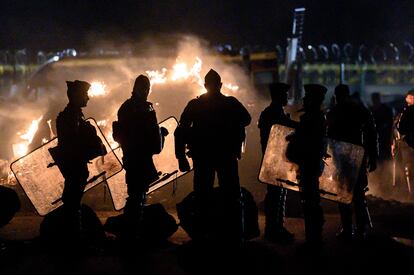
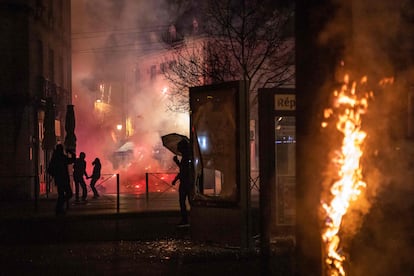
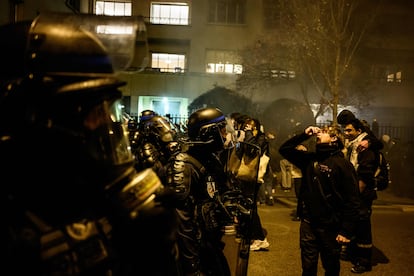
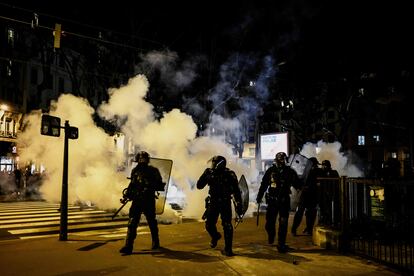
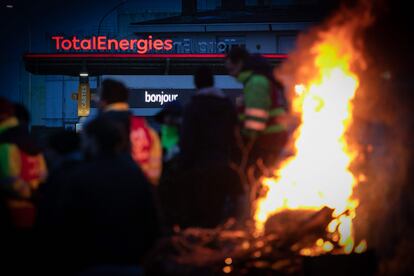
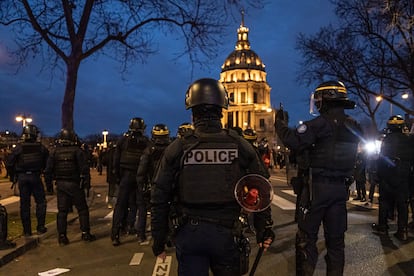
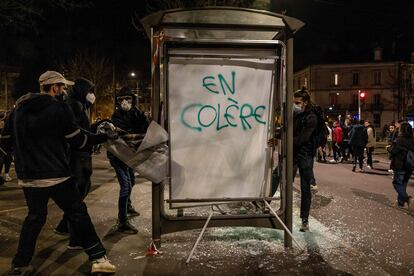

In the French newspaper Le Monde, historian Jean Garrigues wrote: “These expressions of hatred towards the head of state, who is compared to a monarch of the Old Regime, are symptoms of the radical disconnect between many citizens and political elites, of which the head of state is the archetype.”
“French democracy is in a deep, deep crisis,” said Fabien Roussel, the national secretary of the French Communist Party (PCF), before the no-confidence votes. “This is extremely dangerous. We urge the president to come to his senses. It is damaging our republic, our country, and it could cause a serious crisis, the outcome of which nobody knows.” Laure Lavalette, from Marine Le Pen’s National Rally party, declared in the chamber: “More than ever, I am convinced that we are the true alternative.” Addressing the presidential bench, she added: “I am convinced that, after you, it will be our turn.”
After the vote, protesters took to Place Vauban, in front of Les Invalides. Among them was a young man in a suit (tie-wearing protesters are beginning to appear at demonstrations). His name is Axel, and he is 23 years old and a lawyer specializing in labor law. Axel said that he was not there to protest against the pension reform itself, but rather the way Macron adopted it without a vote.
“It’s not fitting for our country,” he said. “I am not a regular at demonstrations, this is the second I’ve gone to in my life, but as a French citizen I believed that I should be here.”
Sign up for our weekly newsletter to get more English-language news coverage from EL PAÍS USA Edition
Tu suscripción se está usando en otro dispositivo
¿Quieres añadir otro usuario a tu suscripción?
Si continúas leyendo en este dispositivo, no se podrá leer en el otro.
FlechaTu suscripción se está usando en otro dispositivo y solo puedes acceder a EL PAÍS desde un dispositivo a la vez.
Si quieres compartir tu cuenta, cambia tu suscripción a la modalidad Premium, así podrás añadir otro usuario. Cada uno accederá con su propia cuenta de email, lo que os permitirá personalizar vuestra experiencia en EL PAÍS.
¿Tienes una suscripción de empresa? Accede aquí para contratar más cuentas.
En el caso de no saber quién está usando tu cuenta, te recomendamos cambiar tu contraseña aquí.
Si decides continuar compartiendo tu cuenta, este mensaje se mostrará en tu dispositivo y en el de la otra persona que está usando tu cuenta de forma indefinida, afectando a tu experiencia de lectura. Puedes consultar aquí los términos y condiciones de la suscripción digital.









































